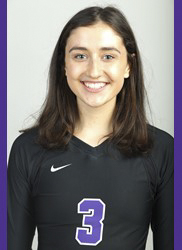Freshman Kate Glavan Excels in Women’s Volleyball

Kate Glavan is a Gallatin freshman who is continuing her family tradition of playing volleyball.
September 11, 2017
Five matches played, five matches started and a total of 39 kills and 35 digs. This is just a simple glance at the start of the greatly anticipated college volleyball career of freshman Kate Glavan.
Glavan’s relationship with volleyball began in the fourth grade. Her mother, an All-American volleyball player at the University of Nebraska and her sister, also an All-American at the University of Massachusetts, were key influences in her development as an athlete. Glavan’s roots have always been deeply embedded in a love for volleyball and a desire for a “deep connection with [her] mom and sister through sports.”
From Edina, Minn. Glavan describes the culture surrounding volleyball and recruiting as very competitive.
“There are tons of great Junior Olympic clubs to play at in the area and competitive college programs,” Glavan said. “As a result, I’ve grown up playing against Division I recruits, thinking nothing of how talented they all were, which has shaped me to be the player I am today.”
Glavan describes herself as having high volleyball IQ.
“I know how to minimize our weaknesses by adjusting the players next to me, along with making strategic plays on my own to score points in court locations where the other team isn’t,” she said.
Head Coach Jolie Ward could not agree more. Ward knew Glavan would be valuable to the university’s program.
“Kate is a talented player that is steady and smart when she plays,” Ward said. “[She has] very high game IQ so she reads the game well.”
Glavin’s steadiness and knowledge of the game are evident to any spectator, whether on the court or off.
“Her confidence allows her to be a significant contributor to the team, especially in high pressure situations,” Glavan’s teammate Sabrina Krebs explained.
A trait like confidence is typically something rare among freshman athletes beginning a college career, but, for Glavan, confidence is her greatest strength, and teammate Rayne Ellis agrees.
“Typically freshmen enter college sports with a certain level of uncertainty,” Ellis said.
“They are usually unsure of our system, how we work together [and] what our coach wants from us,” she said. “Somehow Kate jumped right in and looked calm and confident. It’s a testament to her playing ability.”
As a student-athlete, balancing the schoolwork, practice and lift, while also trying to squeeze in a minute of time to embrace all that New York City has to offer can be a daunting task.
Furthermore, being more than 1,000 miles away from home and reliving the stresses of the label “freshman” can make the college transition seem nearly impossible — but this is not the way Glavan sees it. She said settling into campus a week before the rest of students arrived was a relief for her as it allowed her to get to know the area without too much chaos.
“It’s been easier to get acclimated to college sports than I thought,” Glavan said. “All of the upperclassmen have been super helpful with organizational tips to find the balance between classes and volleyball.”
However, she said the biggest difference between high school and college sports is that there is more free time now that she is not bound by the standard seven-hour high school day. As her time at NYU progresses, Glavan will be studying in the Gallatin School of Individualized Study and embracing career opportunities that come with living in New York City.
After graduation, she plans to continue a relationship with volleyball as a coach for the club her mother directs in Minnesota. “[I want to] continue empowering young girls and [use] volleyball as a vessel to do so,” Glavan said.
A version of this article appeared in the Monday, Sept. 11 print edition. Email Brianna Davis at [email protected].


























































































































































